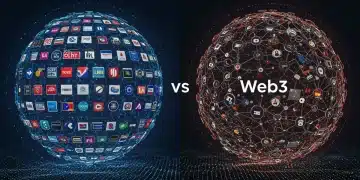Citizen Journalism on Decentralized Platforms: US Voices Rise

Citizen journalism on decentralized platforms is transforming news by empowering individuals across the US to report directly, bypassing traditional media gatekeepers and fostering diverse narratives.
The digital landscape is undergoing a seismic shift, and at the forefront of this transformation is the rise of citizen journalism on decentralized platforms, particularly within the United States. This movement is not just about technology; it’s about empowering individuals, giving voice to communities, and reshaping the very fabric of news dissemination.
The Democratization of News
The traditional media landscape has long been criticized for its centralized control, limited perspectives, and susceptibility to corporate or political influence. Citizen journalism on decentralized platforms emerges as a powerful counter-narrative, democratizing the reporting process and enabling a multitude of voices to be heard.
Decentralized platforms leverage technologies like blockchain to ensure immutability, transparency, and censorship resistance. This creates a space where citizen journalists can operate with greater autonomy and security, free from the constraints of traditional media outlets.

Key Features of Decentralized News Platforms
- Censorship Resistance: Using blockchain technology to prevent single entities from controlling information flow.
- Transparency: Open-source code and transparent governance models foster trust and accountability.
- Incentivization: Cryptocurrency rewards and tokenized systems encourage participation and content creation.
In essence, the democratization of news through citizen journalism on decentralized platforms is about shifting power back to the people, fostering a more inclusive and representative media ecosystem.
Technological Foundations of Decentralized Journalism
The growth of citizen journalism on decentralized platforms is inseparable from advancements in technology. Blockchain, in particular, provides the foundation for secure, transparent, and censorship-resistant news dissemination.
Beyond blockchain, other technologies are playing a crucial role, including decentralized storage solutions and encryption protocols, which protect the privacy and security of citizen journalists and their sources.

Blockchain and Decentralized Storage
Blockchain technology ensures that news articles and multimedia content are stored immutably, making it difficult for governments or corporations to censor or alter information. Decentralized storage solutions like IPFS (InterPlanetary File System) provide a distributed network for hosting content, further enhancing its resilience against attacks.
Encryption and Privacy
Encryption tools and privacy-focused browsers allow citizen journalists to communicate securely with sources and protect their identities in high-risk environments. This is particularly critical in countries where freedom of the press is restricted.
Together, these technological advancements are creating a robust and secure infrastructure for citizen journalism on decentralized platforms, empowering individuals to report news without fear of reprisal.
Empowering Marginalized Voices
One of the most significant impacts of citizen journalism on decentralized platforms is its ability to amplify the voices of marginalized communities. These communities often lack representation in traditional media, leading to skewed narratives and systemic biases.
By providing a direct and unfiltered channel for reporting, decentralized platforms enable marginalized voices to share their stories, perspectives, and experiences with a global audience, fostering greater understanding and empathy.
Case Studies of Marginalized Voices
Throughout the US, citizen journalists are using decentralized platforms to report on local issues that are ignored by mainstream media, such as environmental injustices, police brutality, and housing discrimination.
- Indigenous Communities: Reporting on land rights disputes and cultural preservation efforts.
- Immigrant Communities: Sharing stories of resilience and navigating legal challenges.
- LGBTQ+ Communities: Documenting discrimination and celebrating diversity.
Through their reporting, these citizen journalists are not only informing the public but also advocating for change and holding institutions accountable.
Challenges and Opportunities
While the rise of citizen journalism on decentralized platforms presents immense opportunities, it also faces significant challenges. Overcoming these challenges is crucial for ensuring the long-term viability and impact of the movement.
One of the primary challenges is combating misinformation and disinformation. Decentralized platforms, by their very nature, lack the traditional gatekeepers that filter and verify information, making them susceptible to the spread of false or misleading content.
Combating Misinformation
Developing decentralized fact-checking mechanisms and promoting media literacy are essential for mitigating the risks of misinformation. Encouraging critical thinking and empowering users to identify credible sources are also crucial.
Sustainable Funding Models
Another challenge is establishing sustainable funding models for citizen journalists. Traditional journalism relied on advertising revenue, but decentralized platforms require innovative approaches, such as crowdfunding, cryptocurrency donations, or tokenized incentives.
Despite these challenges, the opportunities for citizen journalism on decentralized platforms are vast. By leveraging technology, empowering marginalized voices, and fostering collaboration, the movement can reshape the future of news and information.
The Role of DAOs in Decentralized Journalism
Decentralized Autonomous Organizations (DAOs) are emerging as a powerful tool for organizing and governing citizen journalism initiatives. DAOs provide a framework for collective decision-making, resource allocation, and community engagement, fostering transparency and accountability.
In the context of citizen journalism, DAOs can be used to manage funding, curate content, and resolve disputes, ensuring that the platform operates in a fair and democratic manner.
How DAOs Enhance Citizen Journalism
- Community Governance: Token holders can vote on key decisions, such as content moderation policies and funding priorities.
- Transparent Funding: Donations and revenue can be managed transparently through smart contracts, ensuring accountability.
- Dispute Resolution: DAOs can establish mechanisms for resolving disputes between citizen journalists and community members.
By leveraging the power of DAOs, citizen journalism platforms can create sustainable and resilient ecosystems that are governed by their communities, not by centralized entities.
The Future of News in the Decentralized Age
The rise of citizen journalism on decentralized platforms is indicative of a broader trend towards decentralization in the media landscape. As trust in traditional institutions erodes, people are increasingly seeking alternative sources of information that align with their values and perspectives.
In the future, we can expect to see a proliferation of decentralized news platforms, powered by blockchain, DAOs, and other emerging technologies. These platforms will empower individuals to report news from their communities, amplify marginalized voices, and foster a more inclusive and representative media ecosystem.
Predictions for the Future
The role of citizen journalists will expand, and they will collaborate more with traditional journalists, the lines between professional and citizen journalism will blur because of technology’s advancement
- Enhanced Verification: Decentralized fact-checking mechanisms will become more sophisticated, enabling users to identify misinformation more effectively.
- Personalized News Feeds: AI-powered algorithms will curate personalized news feeds based on user preferences and interests, ensuring that people receive the information they need.
- Global Collaboration: Citizen journalists around the world will collaborate on cross-border investigations, holding powerful institutions accountable.
The future of news is decentralized, collaborative, and empowering. By embracing technology and fostering community engagement, we can create a media ecosystem that serves the interests of all citizens.
| Key Point | Brief Description |
|---|---|
| 📢 Empowerment | Citizen journalism allows ordinary individuals to report news, bypassing traditional media outlets. |
| 🛡️ Censorship Resistance | Decentralized platforms use blockchain to prevent censorship and ensure news remains accessible. |
| 🌐 Marginalized Voices | These platforms amplify voices often ignored by mainstream media, fostering diverse narratives. |
| 💡 DAOs | Decentralized Autonomous Organizations aid in governing citizen journalism initiatives, ensuring fair operation. |
What is citizen journalism?
▼
Citizen journalism is when regular people, not professional journalists, report and share news.
What are decentralized platforms?
▼
Decentralized platforms use technology like blockchain. No single entity controls the information shared.
How does decentralization fight censorship?
▼
Blockchain makes altering data very hard. This means news can’t be easily censured by governments.
Why is citizen journalism important in the US?
▼
It gives a voice to those not typically heard in mainstream media. It also increases viewpoints.
What challenges does citizen journalism face?
▼
Verifying news and stopping the spread of false information are big challenges.
Conclusion
The rise of citizen journalism on decentralized platforms is a transformative phenomenon that is reshaping the media landscape in the United States. By empowering individuals to report news directly, these platforms are fostering a more inclusive, transparent, and democratic media ecosystem. While challenges remain, the opportunities for citizen journalism to inform, engage, and empower communities are immense, paving the way for a future where news is truly by the people, for the people.
“`





